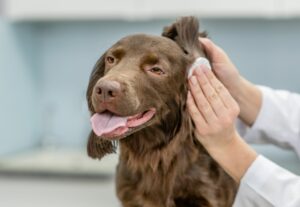(My favourite time of year)
Tips to enjoy the Easter weekend safely and as healthy as possible!
Easter is the first big holiday weekend of the year and is a great time to relax with your family and your pets. But dangers are lurking for your furry friends.
Chocolate
Chocolate is a big part of the Easter weekend, not just eggs but also cakes and other desserts. We might love it, but it is one of the worst things your pooch can eat.
Chocolate contains a chemical called theobromine which is poisonous to a lot of animals, including dogs. Dark chocolate is particularly dangerous as it has the highest levels, but even milk chocolate can be dangerous, particularly if eaten in large volumes and with all those Easter Eggs around the house that could be possible. It can cause symptoms from vomiting and diarrhoea which can – in some cases – become very serious and lead to tremors, fitting and even heart problems. If your dog eats chocolate, you should get them to a vet as soon as possible where they will be given medication to induce vomiting.
Wrappers, while not poisonous, are not good for your dogs and could cause a bowel obstruction. Keep all chocolate eggs firmly shut away from your dogs. Remember they can jump and climb if they think there is a treat on offer.
If your dog becomes lethargic and is having difficulty defecating, they could be suffering from an obstruction. Visit your vet if you suspect this.
Find out more about the items that can poison your dog from the RSPCA.
Bones and Gravy
The Easter meal is a central part of many family celebrations, but you should never be tempted to give your dog bones after you have cooked a roast dinner. When bones are cooked, they become dry, and it is easy for bits to splinter. They could become stuck in your dog’s throat or digestive system, causing discomfort and in some cases, blockages to their respiratory or digestive system.
When you prepare your Easter meal, ensure the meat is kept out of reach of your dog and never leave them unattended in a room with food.
Onions are poisonous to dogs, so don’t be tempted to give them leftover gravy that contains onions. They belong to a family of foods called allium, which can damage dogs’ red blood cells, potentially causing anaemia.
Animal charity PDSA can give you more information about what you should and shouldn’t feed your dog.
Alcohol
The bank holiday weekend might involve celebrations that include a glass of wine or beer.
The ethanol in alcoholic drinks is dangerous to cats and dogs because their bodies react more quickly to it than we do. They will experience similar effects as humans like drowsiness, but more severe effects can lead to seizures and coma.
So, keep all alcoholic drinks strictly out of the reach of your pets.
Exercise
The bank holiday weekend gives us all the chance to get outside and enjoy the spring weather. It is a great time to enjoy some walks with your dogs. Remember the amount of exercise your dog needs varies from breed to breed.
If you’re considering a new puppy, please do your research and take advice from organisations like The Kennel Club. Large breeds like Labradors need up to two hours of exercise every day, a Yorkshire Terrier more like 30 minutes. Healthy mobility supplements for dogs are an important part of their diet, particularly as they age. Added ingredients like glucosamine, chondroitin, turmeric, and green-lipped mussels are useful for supporting joints, reducing inflammation and keeping your best friend healthy and happy on their walks. If they develop a noticeable limp, you should consult your vet.




